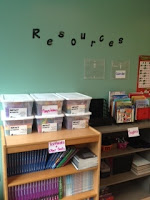Yup. You. Awesome.
First, let me say thank you.
This week I've started my conferencing schedule with all of you. Continually I am inspired and impressed with your commitment and level of work. You are an incredibly dedicated and talented staff, and sometimes I get so super excited about pushing you to the next step, that I forget to celebrate how far you've come. Let's pause for a minute to look back. Over the last 8 school days, all of you have successfully
- Scheduled and launched conferences, giving our girls the important individual attention they need.
- Provided girls with the full picture of responsibilities through the unit contracts.
- Empowered our girls with the agency to set goals around those unit expectations
- Transformed your classroom spaces into a tool for their learning
- Begun the hard work of developing your classroom communities
When you're feeling like the weeds are gonna consume you, it's hard to feel like you're doing good work until you make yourself stop and look back. So, please take that moment right now and reflect on how far you've already come in your teaching, your work with the girls, and your approach as an educator. All of this has happened in just 8 school days!
If you happen to be reading this over your Sunday morning coffee (because that's the kind of workaholic you are), take a minute to read this Op Ed from the Times. It talks about developing grit in our students. The same grit that you guys show me every single day!
Professional Development
Residencies
In the upcoming weeks, I will be working with Tom & Ian in their Group Q Geometry class. This form of PD is what's known as a residency in the Learning Cultures world. Through my work with Tom & Ian, I will not only provide them support and guidance as they continue their good work, but also I will have a better understanding of the challenges you guys face every day as you work in this.
Tom & Ian will be the first of my residencies and I hope to do one of these each month. I encourage you guys to come in to see our work with Group Q as we conduct conferences, build out resources for Work Time, and run Unison Reading groups.
Coaching
Emily and Tara, our Learning Cultures coaches, will be pushing into classrooms as well as providing extended coaching sessions. In the high school, Emily is working with Noam and Darby to help them develop anchor classrooms that we can use as models for our own professional development. Tara is working with Hassan, Marianna, and Damon to launch LC in their classes. I am working with everyone else. Together, we encourage you all to reach out to us whenever you need support, and come visit the classrooms we're in with teachers to see various formats in action. Soon, we'll be sharing a PD calendar to help you know where to and what you can see! Keep an eye out.
There are many more PD opportunities coming up. My next round of visits will be focusing on your Unison Reading Groups. To prepare for those visits (which will start next week), please take a moment to review the following
- Intro to Unison Reading (excerpted from Unison Reading, by Cynthia McCallister)
- Learning Cultures, a New Pedagogy (also from Cynthia) will help you better understand how to think about the formats, Unison Reading in particular
- The Unison Reading Rubric - pay particular attention to 2D and 1E. Focus your efforts on getting to proficiency, particularly on these two rubric points.
Once we get the schedule and offerings settled with Tara, Emily, and Kelly, I'll post up the PD support opportunities for you here on the blog.
.JPG)
.JPG)









